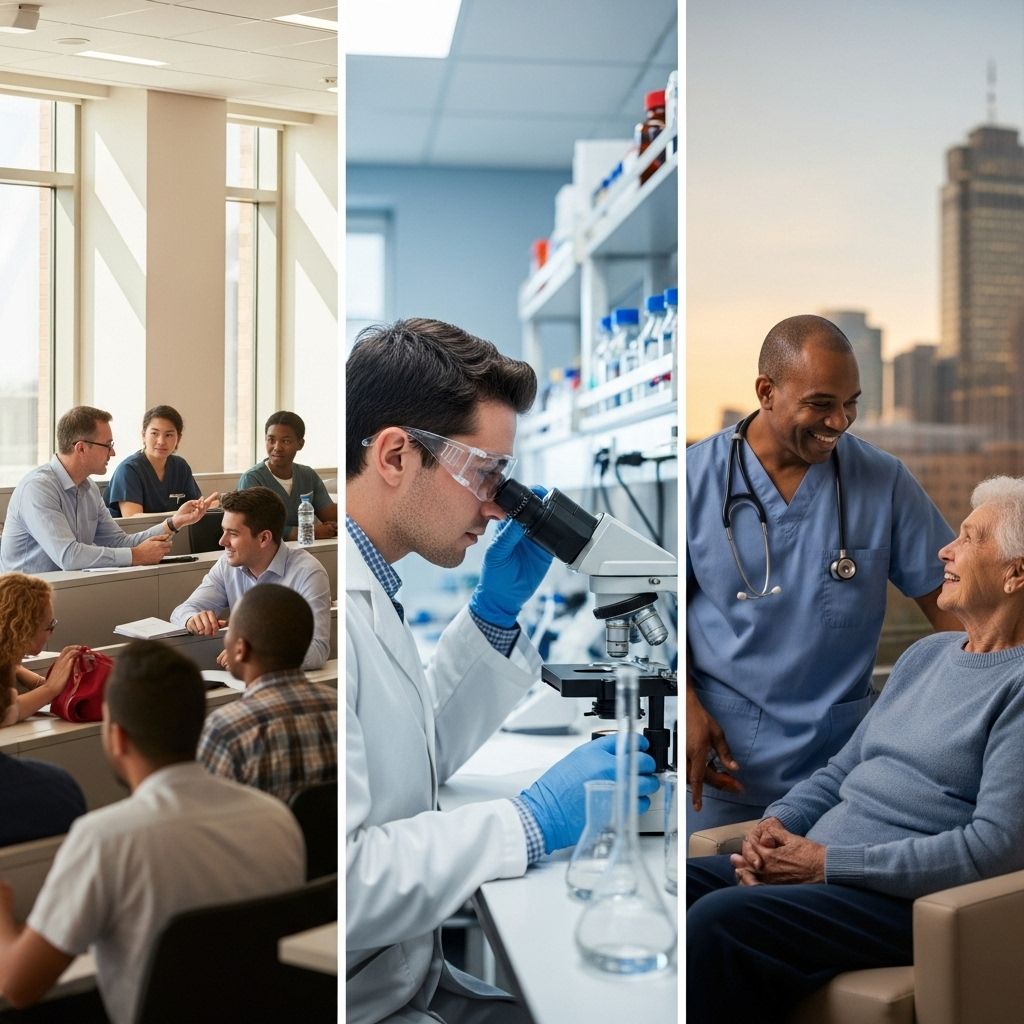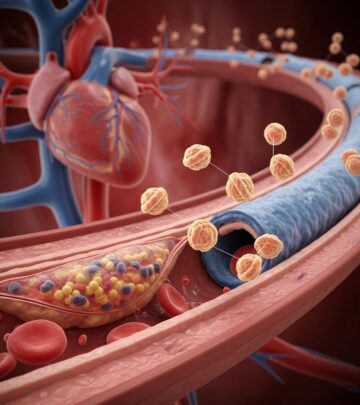Johns Hopkins University School of Medicine: Education, Research, and Impact
Pioneering medical education, ground-breaking research, and transformative care at Johns Hopkins School of Medicine.

Welcome to the Johns Hopkins University School of Medicine
The Johns Hopkins University School of Medicine stands as a beacon of medical innovation, educational excellence, and compassionate healthcare. For over a century, it has shaped the future of medicine through pioneering research, advanced clinical care, and the cultivation of tomorrow’s leaders in health science.
Table of Contents
- Our Mission and Vision
- Educational Excellence
- Innovative Curriculum and Training
- Research Leadership
- Cutting-Edge Patient Care
- Community Engagement and Global Health
- Commitment to Diversity, Equity, and Inclusion
- Our Medical Campus
- Accolades and Recognitions
- Frequently Asked Questions (FAQs)
Our Mission and Vision
Johns Hopkins University School of Medicine is dedicated to advancing human health through discovery, education, and patient care. The institution’s mission is threefold:
- Educating future medical leaders by delivering world-class, student-centered training.
- Conducting transformative research that expands knowledge and improves care.
- Delivering compassionate and innovative healthcare that serves communities locally and globally.
By integrating education, scientific inquiry, and clinical excellence, the school prepares its graduates to confront the evolving challenges of medicine and public health.
Educational Excellence
Johns Hopkins School of Medicine is consistently ranked among the top medical schools in the United States and the world. Its educational programs are renowned for their rigor, flexibility, and integration of research and clinical experience.
Main educational offerings include:
- Doctor of Medicine (M.D.) Program
- Combined M.D.-Ph.D. (Medical Scientist Training Program)
- M.D.-M.P.H (Master of Public Health), M.D.-M.B.A. (Business Administration), and other dual-degree options
- Graduate programs in biomedical sciences
- Residency and fellowship programs across all major specialties
- Continuing Medical Education (CME) for practicing professionals
The faculty, belonging to a diverse array of subspecialties, are deeply committed to teaching and mentorship, empowering learners at every stage of their journey.
Innovative Curriculum and Training
At Johns Hopkins, education takes a patient-centered and inquiry-driven approach. The curriculum has evolved to emphasize not only foundational biomedical knowledge but also communication, leadership, and ethical practice. Key features include:
- Genes to Society Curriculum: Integrates basic, clinical, and social sciences, advancing from molecular biology to patient/population health.
- Longitudinal Clerkships: Early exposure to patient care through continuity clinics and hospital rotations.
- Scholarly Concentrations: Medical students pursue mentored, individualized research or scholarship projects.
- Team-Based Learning: Interdisciplinary teams foster collaboration, communication, and problem-solving skills.
- Simulation and Technology-Enhanced Learning: Advanced simulation centers and e-learning platforms provide hands-on experience and skill development.
This holistic ecosystem promotes both scientific excellence and professional growth, ensuring that graduates are equipped to lead within increasingly complex healthcare systems.
Research Leadership
The School of Medicine is internationally recognized for its trailblazing research enterprise, driving pivotal discoveries that translate rapidly from bench to bedside.
- Basic Science Innovation: Faculty and students are at the forefront of genetics, molecular biology, neuroscience, immunology, and more, unraveling mechanisms of disease and identifying new therapeutic targets.
- Clinical Research: Cutting-edge trials evaluate emerging diagnostics, therapies, and prevention strategies across all specialties.
- Translational Research: Cross-disciplinary centers accelerate the transfer of laboratory findings into real-world medical solutions.
- Funding and Support: Johns Hopkins receives significant federal funding (e.g., NIH grants) and fosters a culture of innovation through robust internal resources, startup incubators, and partnerships.
Major areas of research excellence span cancer, cardiovascular medicine, precision medicine, infectious diseases, mental health, regenerative medicine, and beyond. Research training is integrated throughout the educational experience, from mentored projects in the M.D. program to advanced postdoctoral fellowships.
Cutting-Edge Patient Care
The Johns Hopkins Health System is the clinical arm of the institution, providing a full spectrum of care to diverse patient populations, from routine health maintenance to complex tertiary and quaternary services.
- Johns Hopkins Hospital: Consistently ranked among America’s top hospitals, leading in specialties such as neurosurgery, oncology, ophthalmology, psychiatry, and rheumatology.
- Specialty Centers: Home to specific centers of excellence such as the Sidney Kimmel Comprehensive Cancer Center, the Wilmer Eye Institute, and the Johns Hopkins Proton Therapy Center.
- Patient- and Family-Centered Care: Emphasizes open communication, shared decision-making, and respect for patients’ values and cultures.
- Integrated Health Teams: Multidisciplinary collaborations among physicians, nurses, and allied health professionals optimize outcomes and patient safety.
Innovative technology – from robotic-assisted surgery and genomic diagnostics to digital health and telemedicine – expands access to advanced care for patients locally and worldwide.
Community Engagement and Global Health
Rooted in Baltimore, Johns Hopkins School of Medicine maintains strong ties to its local community while fostering a global outlook. The institution engages in:
- Community-based Programs: Providing preventive care, health education, and support services to underserved populations.
- Public Health Partnerships: Collaborates with public agencies, nonprofits, and community organizations to address social determinants of health.
- Global Health Initiatives: Faculty and students participate in research, training, and clinical projects in more than 130 countries, addressing urgent issues such as infectious disease, maternal and child health, and health system strengthening.
These efforts reflect a deep commitment to health equity, population health improvement, and empowering communities to create lasting change.
Commitment to Diversity, Equity, and Inclusion
Johns Hopkins School of Medicine is firmly committed to fostering a diverse, inclusive, and supportive environment for learners, faculty, staff, and patients. Key programs and principles include:
- Recruitment and Retention: Proactive strategies to attract and support students, residents, and faculty from historically underrepresented backgrounds.
- Bias Reduction and Cultural Competence: Training and support services for all members to promote equitable care and a respectful workplace.
- LGBTQ+ Inclusion: Policies and programs to ensure gender and sexual diversity is respected and affirmed within all areas of medical education and care.
- Wellness and Advocacy: Dedicated resources addressing wellbeing, advocacy for justice, and career development.
The school’s Office of Diversity, Inclusion, and Health Equity leads institutional efforts, ensuring systemic change and accountability at every level.
Our Medical Campus
Johns Hopkins Medicine’s main campus is located in historic East Baltimore, but its reach spans across multiple locations in Maryland and the national capital region.
- State-of-the-Art Facilities: The campus features modern research buildings, advanced clinical facilities, educational spaces, and technology-rich simulation centers.
- Affiliated Hospitals: Includes Johns Hopkins Bayview Medical Center, Howard County General Hospital, Suburban Hospital, Sibley Memorial Hospital, and All Children’s Hospital in Florida.
- Interdisciplinary Collaborations: Proximity to the schools of Nursing, Public Health, and Engineering fosters cross-sector innovation and team learning.
All facilities are designed to support collaborative discovery, seamless education, and the highest standards in patient care.
Accolades and Recognitions
| Area | Recognition | Year/Source |
|---|---|---|
| Medical Education | Consistently ranked among America’s top 3 medical schools | U.S. News & World Report, annual |
| Research | Top recipient of NIH medical research funding | NIH, annual |
| Clinical Care | Johns Hopkins Hospital named among best for 29th year | U.S. News & World Report, annual |
| Specialty Excellence | Nationally ranked in 15+ specialties | U.S. News & World Report |
| Diversity & Inclusion | Recognized as a leader in advancing equity and inclusion | Multiple national awards |
Frequently Asked Questions (FAQs)
Q: Where is the Johns Hopkins School of Medicine located?
A: The main campus is in East Baltimore, Maryland, at 733 N. Broadway, and is part of a larger medical campus that includes affiliated hospitals and specialty centers throughout Maryland and beyond.
Q: How competitive is admission to Johns Hopkins School of Medicine?
A: Admissions are highly competitive, with a holistic process evaluating academic excellence, research experience, leadership, community service, and commitment to advancing healthcare.
Q: What financial aid and support are available for students?
A: The school offers need-based scholarships, grants, loan programs, and financial counseling to ensure access for talented students, regardless of background.
Q: What are some signature research achievements from Johns Hopkins?
A: Johns Hopkins has pioneered many medical breakthroughs, from the development of the first “blue baby” operation for congenital heart disease to advances in cancer, neuroscience, genetics, and transplant surgery.
Q: How does the school support student wellbeing?
A: Comprehensive wellness resources are available, including mental health services, mentoring, career guidance, advocacy offices, and extracurricular opportunities to support the wellbeing and personal growth of all students.
Q: Why is Johns Hopkins considered a global leader?
A: Through its commitment to discovery, education, clinical innovation, and global outreach, Johns Hopkins has shaped medical practice and policy for over 125 years, impacting countless lives locally and globally.
References
- https://brand.hopkinsmedicine.org/writing-and-style-guidelines
- https://universitycommunications.jhu.edu/tools-and-resources/johns-hopkins-university-style-guide/
- https://www.library.jhu.edu/library-services/electronic-theses-dissertations/formatting-requirements/
- https://brand.hopkinsmedicine.org/downloads/other-templates
- https://browse.welch.jhmi.edu/scholarly_publishing/writing_resources
- https://pmc.ncbi.nlm.nih.gov/articles/PMC6516722/
- https://blog.collegevine.com/how-to-write-the-johns-hopkins-university-essays
- https://intranet.insidehopkinsmedicine.org/international
Read full bio of medha deb












